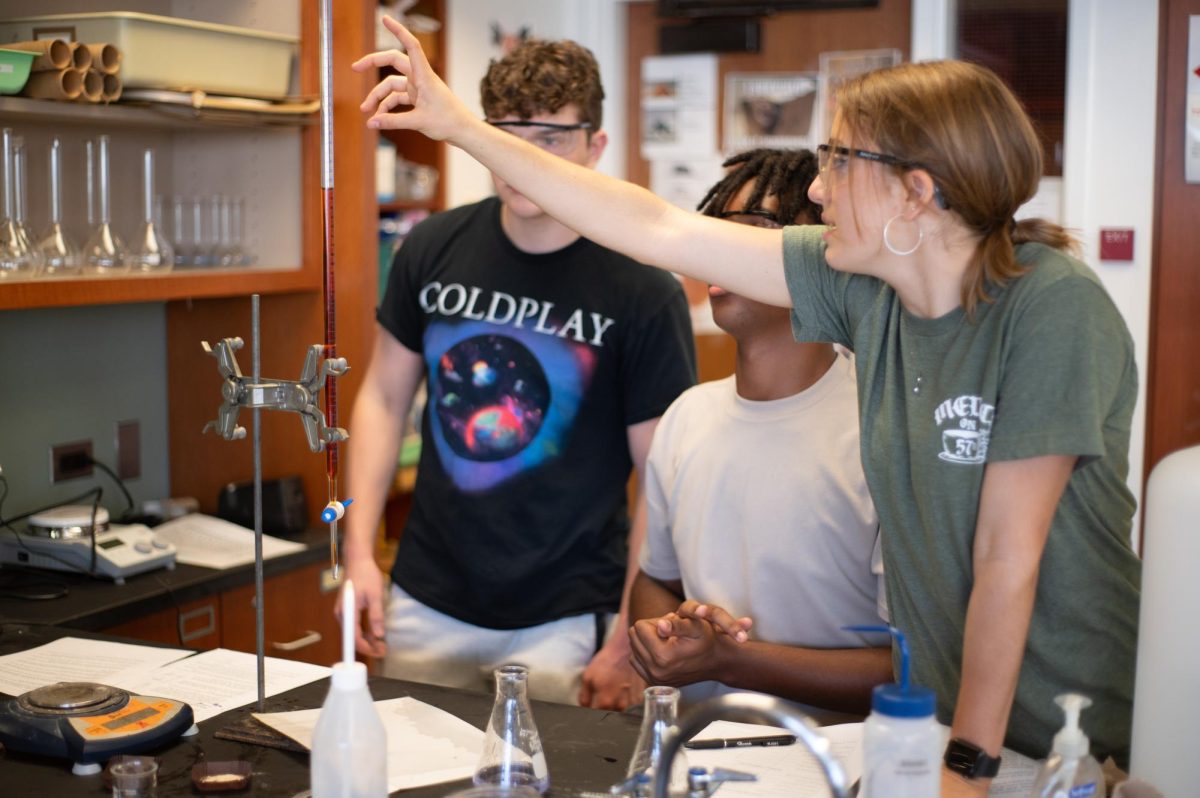During a busy and chaotic AT Chemistry lab period, 20 students run around the classroom collecting different chemicals and solutions, all competing for the teacher’s attention, the sound of glass beakers clinking in the air. Amid all the chaos, Poppy Beiser, a senior and teaching assistant, stands out as a calm and knowledgeable presence, readily available to assist students with their lab.
“For smaller questions, I’ve found that it’s easier for students to quickly reach out to me,” Poppy said.
In multiple AT Chemistry and AT Physics II classes, this scene is a common occurrence. The science department has introduced an innovative independent study utilizing senior students as teaching assistants, which is reshaping how the advanced science courses will be taught in the future.
The responsibilities of these teaching assistants are multifaceted. They are provided with lab materials in advance, consult with the teacher regarding questions and recommendations, and ensure that everything is ready on the day of the lab. During the lab, they actively assist students, ensuring a smooth and productive learning experience.
Zachary Hund, science department chair, and Matthew Martino are working with four seniors this year. At the end of last year, Dr. Hund and Dr. Martino chose these students after they excelled in their AT Chemistry or AT Physics classes. This year, two students have been selected to assist each class. This is the first year the program has been able to run.
“This is a result of the new schedule because these students have free lab periods to sign up for this optional volunteering opportunity,” Dr. Hund explained. “It is something common in undergrad institutions. Generally in high school, it is not possible to offer this opportunity, so I really wanted to jump on it and try to offer it because it really makes Lab stand out and as being unique.”
The program is beneficial for three key parties. Firstly the student assisting the course can gain experience mentoring, teaching and applying their scientific knowledge from previous years. Second, students in the AT science sections benefit from having an additional resource. Lastly, the teachers have a reliable assistant to help manage the increasingly chaotic nature of fast-paced experiments and lessons.
Anvi Pati, a teaching assistant for AT Physics II, emphasized the benefits of this hands-on learning experience.
“It’s been fun. I learn more about the material, too,” Anvi said. “You learn by doing the lab itself as well as answering questions about the lab.”
Poppy, a teaching assistant for AT Chemistry, noted that students find it easier to reach out to her for quick clarifications.
“I felt really honored that my teacher from last year recommended for me to become a TA. I’ve enjoyed taking two years of chem, and so being able to continue that in senior year has been really nice,” Poppy said. “I’ve definitely got a lot of teaching experience out of this, and I’ve really enjoyed explaining concepts and helping out my peers. It’s also nice to have more responsibilities.”
The success of this pilot program has sparked discussions about its future expansion. Dr. Hund said this could include adding it to the program of studies as an official course offering, allowing more students to participate.






















































